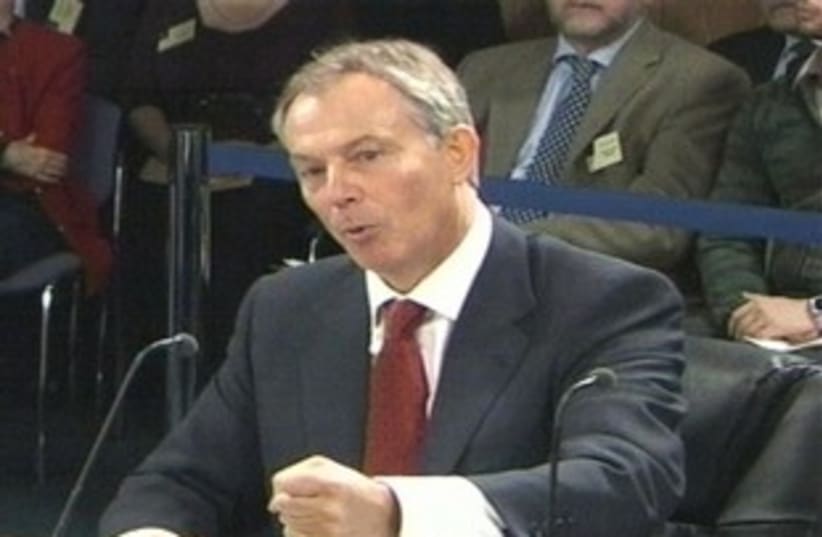He was right and he'd do it again.
That was Tony Blair'smessage Friday as he fought for his place in history against criticswho contend it was folly to join the Americans in invading Iraq basedon intelligence that was faulty and weapons of mass destruction thatturned out not to exist.
The highly anticipated testimony beforean official inquiry into Britain's role in the Iraq conflict providedboth a reprise and a coda to the Blair years:The former British prime minister showed his impressive rhetorical skills andhigh-minded principles, but left unanswered whether the war thatdefines his mixed legacy was justified.
Many in the audience, including the relatives of soldiers and civilians killed in the war, were not impressed. Blair'sclaim to have no regrets drew an angry outburst. As he left, one manstood up and shouted "You are a liar!" A second added: "And a murderer."
Thesix-hour session Friday capped a wide-ranging inquiry that sinceNovember has heard extensive evidence from government lawyers andministers who raised doubts about the legality and wisdom of the 2003Iraq invasion, which was extremely unpopular in Britain.
The IraqInquiry panel plans to issue a report next year, but does not have amandate to apportion blame or the power to bring any criminal charges.
Many Britons blamed Blairfor blindly following the Americans — he was dubbed "Bush's poodle" andaccused of making a backroom deal with the US president.
But while Blairshowed signs of nerves during Friday's testimony — even nibbling on thewings of his spectacles at one point — he was unrepentant as hedefended the decision to topple Saddam Hussein and warned that today'sleaders face similar tough choices as they confront Iran over itsnuclear program.
"The decision I took — and frankly would takeagain — was, if there was any possibility that he could develop weaponsof mass destruction, we would stop him," Blair said. "It was my view then and that is my view now."
"This isn't about a lie, or a conspiracy, or a deceit, or a deception," Blairsaid. "It's a decision. And the decision I had to take was, givenSaddam's history, given his use of chemical weapons, given the over 1million people whose deaths he had caused, given 10 years of breakingUN resolutions, could we take the risk of this man reconstituting hisweapons program?"
Blair said the Sept.11 attacks changed everything, showing that religious fanatics weredetermined to inflict mass casualties. That made it too dangerous toleave Saddam in power, he said, because Saddam's Iraq — or other roguestates, like North Korea or Iran — could form links to terror groupsand attack the West.
Blair concededthere were no known ties between Saddam and the al-Qaida architects ofthe 9/11 atrocities, but said he feared such links could have developedif Saddam and his sons remained in power.
Blairalso insisted the US-led invasion would have been called off hadSaddam changed course and proved to UN inspectors that he haddestroyed his arsenal.
That was met with a rebuff by one panelmember, renowned historian Sir Lawrence Freedman, who pointed out inacid tones that it would have been difficult for Saddam to prove he haddismantled weapons he didn't have in the first place.
Blairdid acknowledge postwar planning was flawed. He said his government didnot anticipate the role al-Qaida and Iran would play in destabilizingIraq after the fall of Saddam. The government had planned for ahumanitarian crisis but did not foresee the sectarian violence thatfollowed the invasion, he said.
The mood in the hearing room wasstrained. The audience included many with family killed in Iraq, andtheir presence added a sobering dose of reality to the legalisticjousting between Blair and the distinguished panel, which included knights and a baroness.
Rose Gentle, whose 19-year-old son Gordon was killed in Iraq in 2004, said she felt revulsion at Blair's presence.
"Actually,I felt sick," she said. "He seemed to be shaking as well, which I ampleased about — the eyes of all the families were on him."
It wasmore raucous outside the Queen Elizabeth II Conference Center, wheresome 150 protesters shouted slogans including "Jail Tony" and "Blair lied — thousands died," while rows of police kept them away from the building.
It was an uncomfortable return to the limelight for the once popular Blair,who swept to power with a landslide victory in 1997 but saw his strongbond with the British public disintegrate after the Iraq invasion.
The bouncy step, easy smile and "Call me Tony" bonhomie of Blair'searly years was gone, replaced by a stern, lawyerly figure who foundhimself interrupted and contradicted by his skeptical inquisitors.
Heseemed defensive and sometimes exasperated; he is not a man accustomedto being interrupted, as happened frequently when he started toelaborate and digress. He showed signs of aging — a spreading baldspot, fine lines around his gray-blue eyes — but otherwise lookedtanned and fit.
At times, Saddam seemed to hover over the proceedings — hanged for his crimes in 2006 but still vilified by Blair as evil incarnate.
The other absent figure whose presence was strongly felt was former US President George W. Bush, who early on enlisted Blair's support for the Iraq invasion.
Drinking Malvern spring water throughout the lengthy hearing, Blairdenied falsifying intelligence to boost the case for military action ormaking an early commitment to Bush to use force against Saddam morethan a year before Britain's Parliament approved military action.
Healso said he did not pressure his attorney general, Peter Goldsmith, tochange his view and assert that the invasion would be legal underinternational law.
Blair also insisted the existing UN resolution offered sufficient authority for the invasion.
Mark Wickham-Jones, a professor of political science at the University of Bristol, said Blair's testimony would not change the view among Britons that the war had been a disaster that was Blair's responsibility.
"Iraq is the millstone around his neck," Wickham-Jones said. "His legacy is Iraq, and the inquiry didn't do him any favors."
